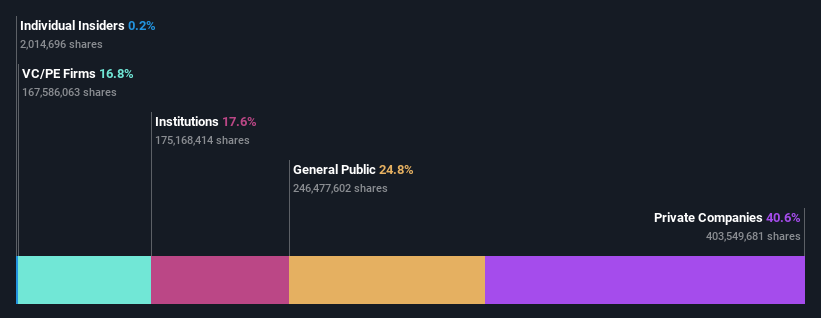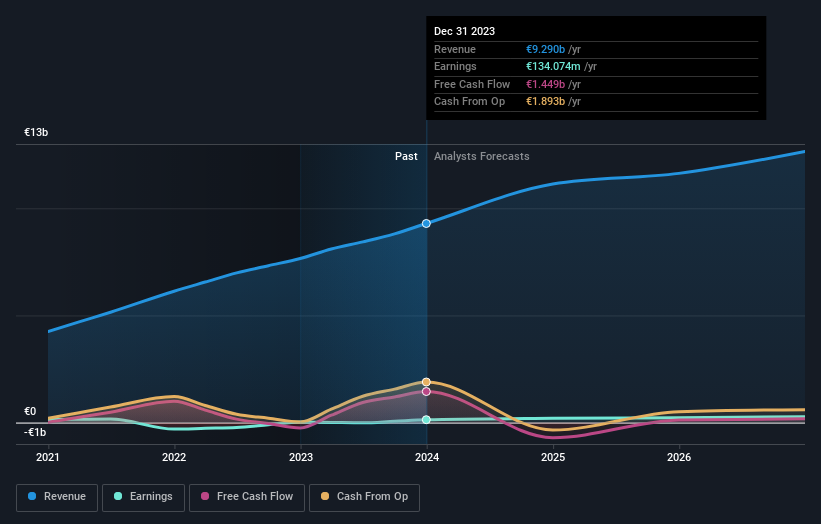Stock Analysis
- Italy
- /
- Construction
- /
- BIT:WBD
Webuild S.p.A.'s (BIT:WBD) largest shareholders are private companies who were rewarded as market cap surged €107m last week

Key Insights
- Significant control over Webuild by private companies implies that the general public has more power to influence management and governance-related decisions
- 57% of the business is held by the top 2 shareholders
- 18% of Webuild is held by Institutions
To get a sense of who is truly in control of Webuild S.p.A. (BIT:WBD), it is important to understand the ownership structure of the business. The group holding the most number of shares in the company, around 41% to be precise, is private companies. Put another way, the group faces the maximum upside potential (or downside risk).
As a result, private companies were the biggest beneficiaries of last week’s 5.5% gain.
Let's take a closer look to see what the different types of shareholders can tell us about Webuild.
View our latest analysis for Webuild

What Does The Institutional Ownership Tell Us About Webuild?
Institutional investors commonly compare their own returns to the returns of a commonly followed index. So they generally do consider buying larger companies that are included in the relevant benchmark index.
We can see that Webuild does have institutional investors; and they hold a good portion of the company's stock. This suggests some credibility amongst professional investors. But we can't rely on that fact alone since institutions make bad investments sometimes, just like everyone does. If multiple institutions change their view on a stock at the same time, you could see the share price drop fast. It's therefore worth looking at Webuild's earnings history below. Of course, the future is what really matters.

Webuild is not owned by hedge funds. Salini Costruttori S.p.A. is currently the company's largest shareholder with 41% of shares outstanding. In comparison, the second and third largest shareholders hold about 17% and 5.0% of the stock.
After doing some more digging, we found that the top 2 shareholders collectively control more than half of the company's shares, implying that they have considerable power to influence the company's decisions.
While studying institutional ownership for a company can add value to your research, it is also a good practice to research analyst recommendations to get a deeper understand of a stock's expected performance. There are plenty of analysts covering the stock, so it might be worth seeing what they are forecasting, too.
Insider Ownership Of Webuild
The definition of company insiders can be subjective and does vary between jurisdictions. Our data reflects individual insiders, capturing board members at the very least. The company management answer to the board and the latter should represent the interests of shareholders. Notably, sometimes top-level managers are on the board themselves.
I generally consider insider ownership to be a good thing. However, on some occasions it makes it more difficult for other shareholders to hold the board accountable for decisions.
Our information suggests that Webuild S.p.A. insiders own under 1% of the company. However, it's possible that insiders might have an indirect interest through a more complex structure. It's a big company, so even a small proportional interest can create alignment between the board and shareholders. In this case insiders own €4.2m worth of shares. It is good to see board members owning shares, but it might be worth checking if those insiders have been buying.
General Public Ownership
With a 25% ownership, the general public, mostly comprising of individual investors, have some degree of sway over Webuild. While this size of ownership may not be enough to sway a policy decision in their favour, they can still make a collective impact on company policies.
Private Equity Ownership
With a stake of 17%, private equity firms could influence the Webuild board. Some might like this, because private equity are sometimes activists who hold management accountable. But other times, private equity is selling out, having taking the company public.
Private Company Ownership
Our data indicates that Private Companies hold 41%, of the company's shares. Private companies may be related parties. Sometimes insiders have an interest in a public company through a holding in a private company, rather than in their own capacity as an individual. While it's hard to draw any broad stroke conclusions, it is worth noting as an area for further research.
Next Steps:
While it is well worth considering the different groups that own a company, there are other factors that are even more important. Consider for instance, the ever-present spectre of investment risk. We've identified 2 warning signs with Webuild , and understanding them should be part of your investment process.
But ultimately it is the future, not the past, that will determine how well the owners of this business will do. Therefore we think it advisable to take a look at this free report showing whether analysts are predicting a brighter future.
NB: Figures in this article are calculated using data from the last twelve months, which refer to the 12-month period ending on the last date of the month the financial statement is dated. This may not be consistent with full year annual report figures.
Valuation is complex, but we're helping make it simple.
Find out whether Webuild is potentially over or undervalued by checking out our comprehensive analysis, which includes fair value estimates, risks and warnings, dividends, insider transactions and financial health.
View the Free AnalysisHave feedback on this article? Concerned about the content? Get in touch with us directly. Alternatively, email editorial-team (at) simplywallst.com.
This article by Simply Wall St is general in nature. We provide commentary based on historical data and analyst forecasts only using an unbiased methodology and our articles are not intended to be financial advice. It does not constitute a recommendation to buy or sell any stock, and does not take account of your objectives, or your financial situation. We aim to bring you long-term focused analysis driven by fundamental data. Note that our analysis may not factor in the latest price-sensitive company announcements or qualitative material. Simply Wall St has no position in any stocks mentioned.
Valuation is complex, but we're helping make it simple.
Find out whether Webuild is potentially over or undervalued by checking out our comprehensive analysis, which includes fair value estimates, risks and warnings, dividends, insider transactions and financial health.
View the Free AnalysisHave feedback on this article? Concerned about the content? Get in touch with us directly. Alternatively, email editorial-team@simplywallst.com
About BIT:WBD
Excellent balance sheet with reasonable growth potential.

